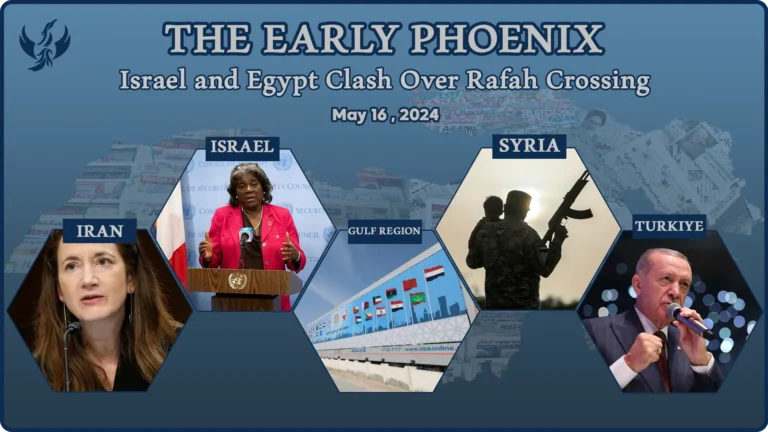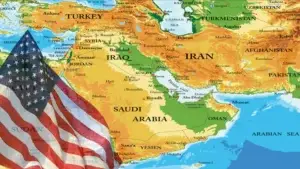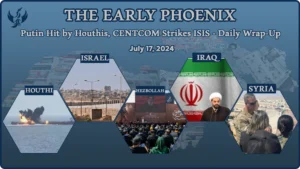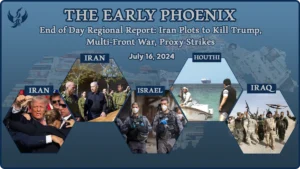TOP HEADLINES:
- US Intelligence Warns of Iranian Threat to 2024 Elections
- UN Security Council Convenes Special Session on Gaza Hostages
- Tensions Flare at Arab Summit Meeting After UAE Blocks Support for Palestine Budget
- Turkish Security Company Deploys Hired Syrian Fighters to Niger
- Rumors of a Coup Attempt in Ankara; Erdogan’s Response Awaited
=======================
★ ISRAEL & PALESTINIAN TERRITORIES
-
Haniyeh Rejects Any Gaza Settlement Excluding Hamas
In a speech marking the 76th anniversary of the Nakba, Hamas leader Ismail Haniyeh blamed Israelis for the current deadlock, stating that their modifications to the ceasefire proposal halted negotiations. Haniyeh rejected any post-war settlement in Gaza that excludes the movement, adding that Hamas is adhering to its demands that any ceasefire include an end to the war in the besieged Strip.
Haniyeh reiterated Hamas’s insistence that any ceasefire must end the blockade war in Gaza. The speech comes after disputes between the Israeli army and government over Gaza’s post-war administration.
-
Netanyahu Acknowledges Disagreements with US Over Rafah Operation
Israeli Prime Minister Benjamin Netanyahu admitted to tensions with the United States regarding the military operation in Rafah, Gaza. While emphasizing the necessity of the operation for Israeli security, Netanyahu expressed hope for alignment with the US perspective. The US, along with other countries, has voiced concerns about civilian safety due to Israeli actions. Discussions with Egypt over reopening the Rafah crossing to allow humanitarian aid into Gaza remain unresolved, with Egypt attributing the closure to ongoing Israeli military operations.
-
UN Security Council Convenes Special Session on Gaza Hostages
The UN Security Council will convene its first meeting since October 7 solely focused on the hostages held by Hamas in Gaza. Titled “Condemning hostage-taking in Israel on Oct. 7 as a psychological tool of terrorism,” the meeting was requested by Israeli Ambassador Gilad Erdan and pushed for by U.S. envoy Linda Thomas-Greenfield. About 20 countries will participate in the less formal “Arria-formula meeting.” The U.S. distributed a concept note blaming Gazan terror groups, including Hamas, for the kidnapping and treatment of the hostages. Five U.S. citizens remain hostages, among approximately 130 abducted on October 7, with their current status unknown.
-
U.S. Completes Gaza Pier Project to Deliver Aid to Gaza
The U.S. military has finished installing a floating pier for the Gaza Strip, aiming to initiate the transportation of humanitarian aid into the conflict-ridden region. This maritime route, established over two months after President Joe Biden’s directive, seeks to augment supplies reaching Gaza, particularly in light of the displacement of 600,000 individuals due to heavy fighting on the outskirts of Rafah. The U.N.’s World Food Program will oversee aid distribution, with Israeli forces managing security on the shore. However, concerns persist regarding the adequacy of aid deliveries to prevent famine, as land corridors remain a more sustainable option. The installation of the pier and causeway faced delays due to adverse weather conditions, with aid shipments set to commence cautiously and gradually increase. The project is estimated to cost at least $320 million.
-
Germany and the Netherlands Take Action To Support Israel
Germany has banned the group Palestine Solidarity Duisburg due to its endorsement of “Palestinian resistance in all forms” and concerns over antisemitic narratives. Police raids targeted properties in Duisburg associated with the organization, and North Rhine-Westphalia’s Interior Ministry accused the group of promoting hatred towards Jews.
In a parallel move, the new center-right government of the Netherlands, including Geert Wilders’s Party for Freedom, is considering relocating the Dutch embassy in Israel from Ramat Gan to Jerusalem. This plan is part of the draft coalition agreement, which also emphasizes Holocaust education in naturalization tests and stricter measures against discrimination and racism. These actions by Germany and the Netherlands reflect European support for Israel and a commitment to combating antisemitism.
-
South Africa Petitions World Court to Order Halt to Israel’s Rafah Offensive
South Africa is set to petition the International Court of Justice (ICJ) on Thursday, seeking an immediate cessation of the Rafah offensive in Gaza, part of its broader case alleging Israeli genocide in the region. Additionally, South Africa demands unimpeded access to Gaza for UN personnel, humanitarian organizations, journalists, and investigators, citing Israel’s alleged defiance of previous court directives. Israel, vehemently rejecting South Africa’s accusations, contends it has intensified humanitarian aid efforts in compliance with ICJ mandates. While ICJ decisions are binding and irreversible, enforcement relies on countries’ compliance, potentially impacting their international standing and setting legal precedents.
=======================
★ JORDAN
-
Israel Renews Water Agreement with Jordan Despite Tensions over Gaza
Israel has extended its water agreement with Jordan for six months, a shorter duration than Jordan had hoped for. Under the 1994 peace agreement, Israel annually transfers 50 million cubic meters of water to Jordan at a reduced price. With tensions rising between the two countries, Israel opted for a shorter extension, likely influenced by Jordan’s recent statements against Israel regarding the Gaza conflict.
=======================
★ IRAN
-
US Intelligence Warns of Iranian Threat to 2024 Elections
Director of National Intelligence Avril Haines briefed the US Senate Select Committee on Intelligence about Iran’s increasing aggression in influencing the upcoming US elections. Haines highlighted Iran’s efforts to sow discord and undermine confidence in democratic institutions, alongside Russia and China. Despite not yet matching the scale of Moscow and Beijing, Iran’s influence tactics are taken seriously in Washington. Recent reports reveal Iran’s strategic intent, including recommendations to establish networks of lobbyists to shape US policies and public opinion in Tehran’s favor. Critics accuse President Biden of being hesitant to confront Iran, fearing escalation in the Middle East.
-
Iran Flaunts Self-Sufficiency in Military and Nuclear Advancements Despite Sanctions
Iran is showcasing its self-reliance in missile and UAV production and its readiness to share nuclear expertise with neighbors, defying Western sanctions. Brigadier General Afshin Khajeh Fard, Chief of Iran Aviation Industries Organization (IAIO), highlighted the nation’s scientific prowess, citing Operation True Promise as evidence of Iran’s capability to independently produce military technology. Concurrently, Behrouz Kamalvandi, spokesperson for Iran’s Atomic Energy Organization (AEOI), declared Iran’s intention to share its nuclear advancements, emphasizing achievements in uranium enrichment and pharmaceutical production. Both officials underscored Iran’s resilience and ability to transform challenges into opportunities, presenting a unified front of technological and scientific progress despite external pressures.
=======================
★ IRAQ
-
Chinese Companies Secure Major Oil and Gas Projects in Iraq
Iraq’s oil ministry announced that Chinese energy firms dominated new licensing rounds, winning bids for exploration in 10 oil and gas fields, surpassing other foreign competitors. Seven Chinese companies, including Sinopec and CNOOC Iraq, secured 10 projects, while Iraq’s KAR obtained three fields. Despite offering an offshore bloc, the first in Iraqi waters, it received no bids. China’s increasing presence in Iraq extends beyond energy, encompassing construction and infrastructure development under initiatives like the Belt and Road. Iraq, aiming to recover from conflict, seeks to boost crude reserves and natural gas production to reduce reliance on imports from Iran, its crucial energy supplier.
-
Iran-Sponsored Iraqi Militants Claim Drone Strike on Israeli Oil Refinery
Iran-backed Iraqi militia armed factions announced a drone strike on Israel’s Haifa oil refinery, following a similar attack on a strategic site in Eilat.
-
PUK Accuses Turkiye of Alarming Military Moves in Northern Iraq
Ali Warhan, a member of the Patriotic Union of Kurdistan, has highlighted Turkish military activities in various parts of Dohuk Governorate, including Batova, Jabal Matin, Shiladzi district, Balketi villages, and areas near Zakho district. Warhan mentioned that the Turkish army conducted a replacement operation at several bases and dug new trenches in Jabal Matin. Additionally, there are plans to establish new military bases on Mount Kitin, enabling Turkish forces to control significant areas and install surveillance systems. Reports suggest that following President Recep Tayyip Erdogan’s visit to Iraq, the Turkish army is set to launch a comprehensive ground operation against the Kurdistan Workers’ Party.
-
Iraq Plan to Halt Gas Flaring in Major Oil Fields
Iraq’s Minister of Oil, Hayyan Abdul-Ghani, announced plans to implement strategic oil projects aimed at environmental sustainability. Highlighting the arrival of French company Total in Iraq, Abdul-Ghani emphasized an accelerated project to cease gas burning in existing facilities within a year. This initiative, known as the Iraq Integrated Project, aims to utilize gas from five oil fields, generating electrical energy and addressing environmental concerns. Additionally, the project includes the establishment of a solar-powered electrical station with a capacity of 100 megawatts and the utilization of treated seawater for oil reservoir injection. This step follows agreements signed in 2023 with Total to develop oil and gas projects, reducing gas flaring and enhancing energy efficiency in Iraq.
-
Iraq Struggling with ISIS Attacks in Northern and Western Provinces
Recent ISIS attacks have resulted in the deaths of multiple Iraqi soldiers, including an officer and five soldiers in separate incidents near Kirkuk and in the Diyala and Salah al-Din provinces. The assaults also injured several soldiers. These incidents highlight the ongoing activity of ISIS cells in Iraq, despite the country declaring victory over the group in 2017.
=======================
★ YEMEN
-
US Intercepts Houthi Drones; Houthi Leader Condemns US Naval Presence
The US Central Command reported multiple successful interceptions of Houthi-launched drones and missiles in Yemen, targeting American, coalition forces, and commercial ships in the Red Sea. On May 13, US forces destroyed two drones and a ballistic missile, and on May 15, they eliminated four additional drones deemed imminent threats. Meanwhile, Houthi leader Muhammad Ali Al-Houthi, a member of Yemen’s Supreme Political Council, criticized the presence of the American destroyer Mason in the Red Sea, calling it a violation and terrorism.
-
Al-Qaeda’s Yemen Branch Intensifies Campaign in Southern Yemen, in Coordination with Houthis
Al-Qaeda’s branch in Yemen, known as “Al-Qaeda in the Arabian Peninsula,” has intensified its activities in southern Yemen, collaborating with Houthi militia. The recent “Flood of Zara” operation, launched on May 12, 2024, aims to deter legitimate Yemeni forces from battling terrorist groups, echoing Hamas’ “Al-Aqsa Flood” operation. Al-Qaeda’s presence in the Lawdar District, adjacent to Houthi-controlled territory, suggests coordination between the two groups. This alliance, facilitated by Iran, aims to destabilize southern Yemen and divert attention from Houthi activities in other regions.
=======================
★ SYRIA
-
Turkish Security Company Deploys Hired Syrian Fighters to Niger
Hundreds of Syrian fighters loyal to Ankara, including 24-year-old Omar, have been transported to Niger by a private Turkish security company to protect Turkish interests and projects. Omar, seeking a better livelihood, now earns $1,500 per month compared to $46 in Syria. The Syrian Observatory for Human Rights reported at least a thousand fighters sent since last year. Fighters undergo weapon training and are deployed to guard sites, with some assigned to combat Boko Haram. Turkiye has deepened ties with Niger’s military regime, which took power in July 2023. Despite secrecy and exploitation claims, these fighters endure dangerous missions abroad for better pay.
-
Lebanese Government Colluding with Assad Regime to Return Displaced Syrians from Lebanon
Lebanon is coordinating with Syria to return 2,500 refugees as part of a voluntary repatriation plan. Lebanese Minister of Displaced Persons, Issam Sharaf al-Din, confirmed direct communication between the Lebanese and Syrian governments, noting a call between Lebanese caretaker Prime Minister Najib Mikati and Syrian Prime Minister Hussein Arnous. Lists of refugees have been submitted for processing, with the first group of 300 already returning. Sharaf al-Din emphasized the political decision to reactivate the return process and mentioned pending issues requiring an official visit to Damascus.
-
Prominent Hezbollah-Linked Drug Kingpin Assassinated in Southern Syria
In Daraa Governorate, a drug dealer associated with Lebanese Hezbollah, Awad Ahmed Awad Al-Masaeed, was killed by unknown gunmen. Known as “Escobar Houran,” Al-Masaeed was a prominent figure in drug trafficking and smuggling, with ties to Hezbollah leaders and regime security officers. He had previously survived a kidnapping and assassination attempt. Southern Syria has become a hub for drug manufacturing and smuggling, orchestrated by the Syrian regime and Hezbollah-backed militias. Despite regional efforts to combat drug trafficking, Syria remains a major producer and exporter of narcotics. Jordan faces heightened threats, engaging in border battles with drug smuggling gangs. Western countries implement sanctions against individuals linked to drug production, particularly those associated with the Syrian regime.
-
ISIS Attacks and Russian Airstrikes Intensify in Syrian Desert
In central Syria’s Homs countryside, two members of the “Liwaa Al-Quds” group, aligned with Russian-backed government forces, were killed in an attack by Islamic State (ISIS) cells near Al-Sukhna. Concurrently, Russian warplanes launched airstrikes on suspected ISIS positions in the Syrian desert, targeting areas in Hama, Raqqa, and Rusafa.
=======================
★ LEBANON
-
Israeli Strikes Escalate After Hezbollah Drone Attack on Northern Israel
Israeli airstrikes targeted Hezbollah strongholds in Baalbek and southern Lebanon after Hezbollah launched drones near Tiberias, wounding three IDF soldiers, one seriously. Israeli strikes hit a facility on the Qana-Ramadiyya highway near Siddiqin, killing one person. Additional raids targeted Iqlim al-Tuffah, Jabal al-Rayhan, Aita al-Shaab, and Kafr Kila, causing fires and injuries. Hezbollah retaliated with a missile launch at Metulla, seriously injuring three in northern Israel, and fired rockets at military positions in northern Israel, including the Upper Galilee. This escalation follows the assassination of a Hezbollah commander in Tyre, marking the most intense cross-border violence since October, with casualties on both sides and tens of thousands displaced.
-
Mikati Denies Making Deal with European Countries on Syrian Refugees
Lebanon’s caretaker Prime Minister Najib Mikati refuted claims of signing any agreement with Europe regarding aid for Syrian refugees, asserting it as a continuation of previous assistance. Mikati and his caretaker government have recently been accused of using the Syrian refugee issue to extract one billion Euros of additional aid from EU countries. Mikati addressed parliament, emphasizing the need for a Lebanese consensus on the Syrian displacement issue and announcing government plans to reduce the number of Syrian refugees in Lebanon, including tightening security on Lebanese lands, cracking down on illegal residency, and enforcing labor laws. Meanwhile, the Syrian Islamic Council highlighted the plight of refugees in Lebanon, urging respect for their rights and denouncing the political exploitation of their situation.
=======================
★ GULF REGION
-
Tensions Flare at Arab Summit Meeting After UAE Blocks Support for Palestine Budget
Tensions flared at the Arab Summit in Manama after the UAE blocked provisions to support the Palestinian Authority’s budget, leading to amendments that nullified financial support decisions. This angered Palestinian officials, who submitted a memorandum in response. An altercation ensued between Palestinian and Emirati officials, prompting intervention from other Arab ministers. The final decision made financial support optional, reversing a 2002 commitment. Palestinian President Mahmoud Abbas is attending the summit. The dispute highlights ongoing friction between the UAE and Palestine, exacerbated by earlier accusations of corruption from the UAE Foreign Minister.
-
Arab Summit Prioritizes Palestinian Issue and Gaza Conflict
Arab leaders gathered in Manama for the 33rd Arab Summit, prioritizing the ongoing conflict in Gaza and the Palestinian cause. The summit aims to unify Arab positions, denounce Israeli aggression, and support Palestinian rights. Key discussions include the Arab Peace Initiative, ceasefire efforts in Gaza, and financial support for Palestine. The draft final statement calls for international protection forces in Palestine until a two-state solution is achieved, along with addressing Sudan’s crisis and stressing Syria’s resolution in accordance with UN resolutions. The summit highlights the importance of regional stability through just and comprehensive solutions.
-
Saudi Arabia Strengthens US Energy Ties–But Reduces U.S. Stock Holdings from $35B to $17B
Saudi Arabia and the United States have signed a roadmap for energy cooperation, emphasizing carbon management, clean hydrogen, nuclear energy, and renewable energy. Saudi Energy Minister Prince Abdulaziz bin Salman and US Energy Secretary Jennifer Granholm agreed on a joint executive plan that includes a timetable for various projects and focuses on enhancing supply chain resilience and energy efficiency. Concurrently, the Saudi sovereign fund has significantly reduced its holdings in American stocks, decreasing from $35 billion to $18 billion by the end of the first quarter of 2024. The fund has completely divested from American financial companies and the travel sector, including notable stakes in BlackRock, Carnival Corp, and Booking Holdings. Instead, it has opted for purchase options on a smaller number of shares to maintain some exposure while mitigating risk. This strategic shift highlights Saudi Arabia’s dual approach of bolstering energy cooperation with the US while reassessing its investment portfolio in American equities.
=======================
★ EGYPT AND NORTH AFRICA
-
Israel and Egypt Clash Over Rafah Crossing
An Israeli security delegation visited Cairo to address tensions surrounding the Rafah crossing, crucial for humanitarian aid and medical evacuations in Gaza. Israel’s recent military actions in Rafah and its control over the crossing have exacerbated tensions with Egypt. Prime Minister Benjamin Netanyahu accused Egypt of obstructing aid delivery, while Egyptian Foreign Minister Sameh Shoukry refuted these claims, emphasizing Israel’s responsibility for Gaza’s humanitarian crisis. Discussions during the visit aimed to ensure Egypt’s prior notification about Israeli military activities in Rafah. Egypt rejected Israel’s proposal for joint coordination of the crossing, insisting it should be managed solely by Palestinian authorities.
-
Saudis Lead Regional Allies in Naval Security Exercise
Egypt, Saudi Arabia, Jordan, Yemen, and Djibouti recently concluded joint naval training exercises, known as “Red Wave – 7,” held in Saudi territorial waters. The exercises aimed to enhance cooperation and unity among participating naval forces and included drills to counter various threats such as speedboat attacks and inspection rights. Practical demonstrations involved storming a coastal island, showcasing coordinated efforts between air and naval units to ensure successful operations. These exercises highlighted regional collaboration at a time when the Houthis continue to attack shipping routes in the Red Sea and beyond.
-
Egypt’s Gas Company Posts 48 Percent Profit Increase in First Quarter
In the first quarter of 2024, Egypt Gas Company reported a 48.08% increase in profits, reaching 138.96 million pounds, with activity revenues surging to 1.31 billion pounds. This financial success comes alongside Egypt’s efforts to bolster its crude oil strategic reserves. The Egyptian General Petroleum Corporation invested 76.18 billion pounds in forming a strategic oil stockpile to shield the economy from global petroleum price fluctuations, exacerbated by the Russo-Ukrainian war. Financial support for petroleum products in the past fiscal year was 125.6 billion pounds, marking a 110% growth.
-
UN Says Gaza War Could Cost Egyptian Economy $20 Billion
A recent study conducted by the United Nations Development Program (UNDP) suggests that the ongoing Gaza war may result in economic losses of up to $20 billion for Egypt. The study evaluates various scenarios and predicts a decline in tourism and Suez Canal revenues, estimating losses of at least $3.7 billion over two fiscal years. The impact on Egypt’s economy includes potential declines in GDP and the Human Development Index (HDI). The report recommends reform priorities, including enhancing systems and attracting partners for support.
=======================
★ TURKIYE
-
Turkiye Blames Talabani and Tehran for Escalating Tensions in Northern Iraq
Turkiye has intensified its military operations against the Kurdistan Workers’ Party (PKK) in northern Iraq, accusing the Patriotic Union of Kurdistan (PUK) of collusion. Turkish Defense Minister Yaşar Guler singled out PUK leader Bafel Jalal Talabani, threatening further actions beyond the airspace ban on Sulaymaniyah. Guler also criticized Iran for not cooperating against the PKK, alleging that Iran turns a blind eye to PKK members. The escalation follows Turkiye’s frequent claims of inflicting heavy losses on the PKK, with the goal of ending the decades-long conflict by summer’s end.
-
Rumors of a Coup Attempt in Ankara; Erdogan’s Response Awaited
Turks awakened on Thursday to rumors of a new coup attempt circulating on social media, prompting arrests in Ankara, including three police directors. The situation unfolded after secret testimony in a mafia case implicated current and former political officials. President Erdogan convened an emergency meeting, hinting at the gravity of the situation. The arrests are linked to an operation against the “Ayhan Bora Kaplan” organization, with implications reaching high-ranking politicians and journalists.
-
US Lawmakers Want to Hold Turkiye Accountable for 2017 Attack on Protestors in Washington, DC
More than 70 members of the US Congress, including heavyweights like Maryland Democrat Steny Hoyer, have signed a letter urging Secretary of State Antony Blinken to press Turkiye for accountability over the 2017 attack by President Recep Tayyip Erdogan’s security detail in Washington. The attack, which injured numerous protesters outside the Turkish ambassador’s residence, prompted bipartisan condemnation and calls for consequences. Despite legal challenges, Turkiye’s diplomatic immunity claim was rejected by the Supreme Court, leading lawmakers to demand accountability for the incident.
=======================
📌 In case you missed it,
📰 THE EARLY PHOENIX May 15, 2024
📰 THE EARLY PHOENIX May 14, 2024
📰 THE EARLY PHOENIX May 13, 2024
=======================
🔗 Follow the latest news from the American Center for Levant Studies via Google News




